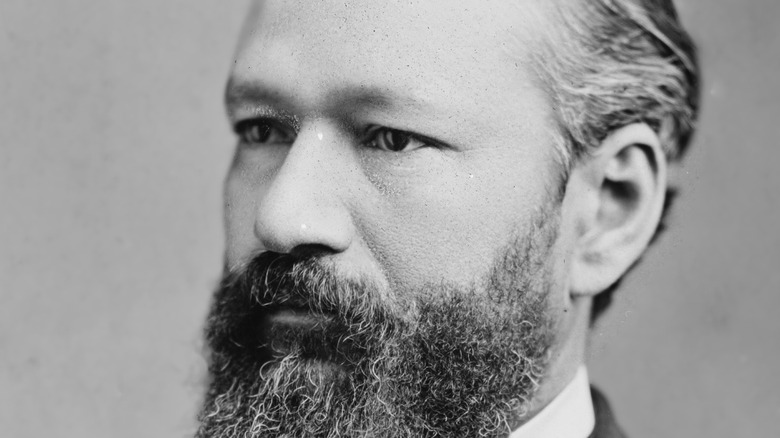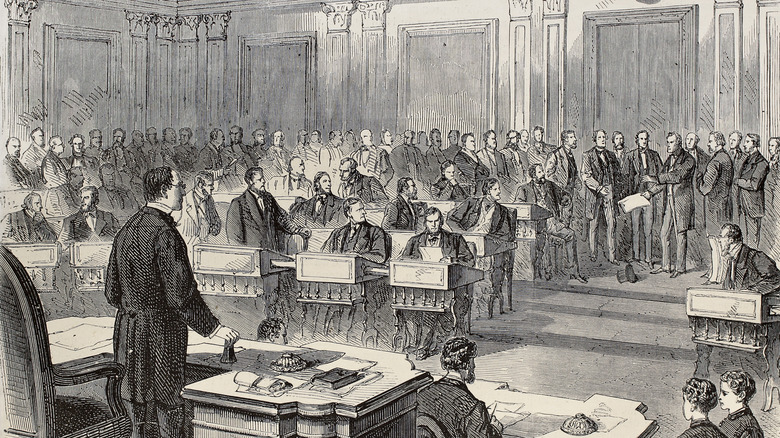A Man Was Elected To The United States Senate But Never Actually Served A Day
The United States Senate is one of the two houses of Congress. Since 1787, each state has sent two representatives to the Senate (via Maryville University). The Senate is smaller than the House of Representatives, currently featuring 100 United States Senators, compared to 435 representatives in the House. Other differences between the two houses include the fact that representatives serve a term of only two years in the House, versus a six-year term in the Senate; and that members of the House Representatives must be a minimum of 25 years old, compared to 30 years old for senators. Many of these factors help contribute to the fact that senators are generally said to have more prestige than House representatives (via Shmoop).
Since 1789, some 1,994 individuals have served as senators in the United States Congress, according to the United States House of Representatives. And for every senator who served, there were undoubtedly many more who would have liked to have held that seat, or who competed for election. But it isn't necessarily common for representatives to be elected and then denied a seat in the senate — though that's just what happened to P.B.S. Pinchback in the 1870s (via PBS).
The Reconstruction Era in the United States
P.B.S. Pinchback, who was born in 1837 to a Black mother and white father, was a notable political figure in Louisiana in the 1870s (via the Louisiana Secretary of State). This was in the middle of the Reconstruction Era, which began after the Civil War ended in 1865 and continued until 1877 (via Britannica). During this period, both Southern and Northern states alike struggled to overcome the specter of the very recent war, and politicians worked to establish new codes and norms for how behavior would be legislated in a post-slavery South. By the late 1860s, that included Black codes, rules which significantly limited the liberty of Black people. For instance, some Black codes banned interracial marriage, while others locked Black workers into labor contracts (via Britannica).
However, the Reconstruction Era was not entirely bad. During this period, for the first time, Black Americans were able to hold office. In fact, two Black men ascended to the ranks of the U.S. Senate in the postwar years, according to Britannica. That number might have been three, if things had gone differently for P.B.S. Pinchback.
Who was P.B.S. Pinchback
P.B.S. Pinchback, or Pinckney Benton Stewart Pinchback, was born in Georgia in the 1830s and grew up in Ohio, according to Britannica. In his early 20s, Pinchback served in the Civil War. After the war was over, he decided to enter politics. His first big step was serving as a delegate at the 1868 Louisiana constitutional convention, according to PBS. Though Pinchback, who was biracial, could have passed for white, he was open about his heritage, historians note. Throughout his life, Pinchback fought for Black rights, including at the Louisiana constitutional convention.
Pinchback truly rose to prominence in 1871, when he became the Governor of Louisiana (via the Louisiana Secretary of State). Pinchback was not actually elected to the position of governor; rather, after the death of the lieutenant governor and subsequent impeachment of the governor himself, Pinchback was next in line for the position. An election was soon held to find a democratically-chosen replacement for the governor, so Pinchback was only in the seat for a little over a month. Still, Pinchback's swearing-in was an historic moment that made Pinchback the first Black governor of Louisiana (via CBS 42).
How Pinchback almost joined the Senate
Later, in 1872, after a new governor was elected in Louisiana, Pinchback was selected to join the U.S. Senate, according to PBS. Nominated by the recent winners of the gubernatorial election, Pinchback seemed poised to ascend to Congress, one of the highest offices in the nation, and in doing so, become the second Black U.S. Senator, after Hiram Revels several years previously (via the United States Senate).
However, it was not meant to be. Democrats, upset about the outcome of the gubernatorial election, soon challenged the results, and there was significant controversy and debate around the administration, including their choice of Pinchback for Senate. Pinchback's nomination was eventually dropped and a different senator was elected, according to PBS.
Pinchback went on to pursue other ventures, becoming a lawyer and helping to found Southern University in Louisiana, according to the National Governors Association. However, it would be more than a century before Black people would start seeing real gains in representation in the Senate. As of 2020, only three of the 100 United States senators were African American, according to CNBC, compared to more than 12 out of every 100 people in the U.S. population (via the United States Census Bureau). That means that, while trailblazing people like P.B.S. Pinchback have made a real difference in United States history, we still have a ways to go.



